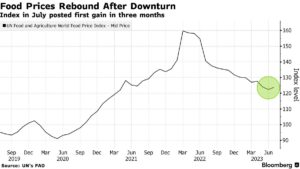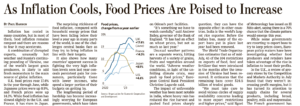Congress has quickly engaged in putting together potential aid packages for farmers that would more than double the Trump administration's $12 billion under the Farmer Bridge Assistance (FBA) Program.
Global Food Prices Climb Slightly in July
Bloomberg writer Megan Durisin reported on Friday that, “Global food prices rose for the first time in three months, as trade disruptions from India to the Black Sea and extreme weather stoke supply concerns anew.

“The United Nations’ index of food-commodity prices gained 1.3% in July, led by vegetable oil, according to a Friday report. That marks a pickup from the two-year low reached the prior month as fresh threats emerge in the supply chain.
“Last month, Russia exited the Black Sea grain deal that helped usher millions of tons of Ukrainian crops abroad. On top of that, top rice exporter India banned some shipments of the staple, and extreme weather is curbing harvests in places like China and southern Europe.”
The Bloomberg article added that, “The rice index from the UN’s Food and Agriculture Organization reached its highest nominal level since 2011, following the curbs in India.”
Also Friday, Dow Jones writer Yusuf Khan reported that, “The UN FAO’s food price index, which tracks global prices for a basket of staple foods, averaged 123.9 points in July, up 1.3% from June and driven by higher quotations for vegetable oils globally. The figure, however, was 11.8% lower than in the same month last year.”
And Paul Hannon reported in Saturday’s Wall Street Journal that, “Inflation has cooled in many countries, but in most of them, food inflation remains rampant and there are reasons to fear it may accelerate.
“A combination of disrupted exports, unusually hot weather and Russia’s continuing pounding of Ukraine, one of the world’s largest grain producers, is likely to add fresh momentum to the main source of global inflation.”

Hannon noted that, “The United Nations on Friday said its index of food prices that includes cereals, vegetable oils, sugar, meat and dairy products rose by 1.3% in July from June, a second increase in four months after a steady decline from the 50-year high reached in March 2022.”
The Journal article added that, “The International Monetary Fund estimates that Russia’s withdrawal from the export deal could push grain prices up by between 10% and 15%, reversing some of the declines from the highs recorded last year.”





